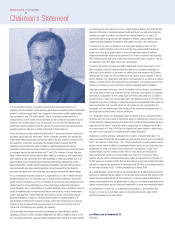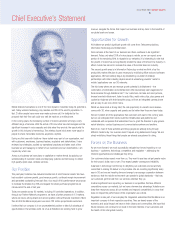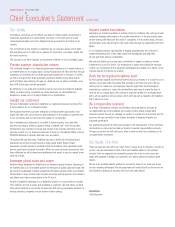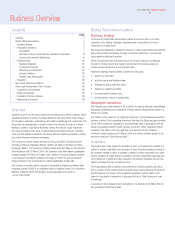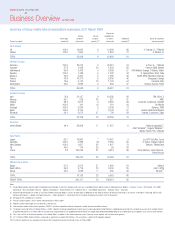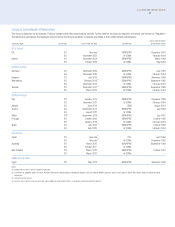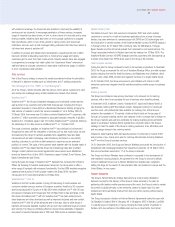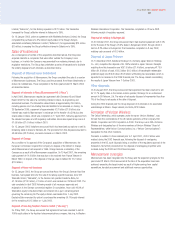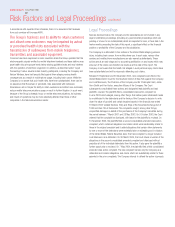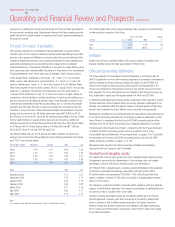Vodafone 2004 Annual Report Download - page 16
Download and view the complete annual report
Please find page 16 of the 2004 Vodafone annual report below. You can navigate through the pages in the report by either clicking on the pages listed below, or by using the keyword search tool below to find specific information within the annual report.
Vodafone Group Plc Annual Report 2004
14
Business Overview continued
by NRAs on those undertakings that are found to have SMP in a relevant market
under the new EU Framework.
Appeal rights, under the new EU Framework, are strengthened by the introduction of a
right of appeal on the merits of any NRA decision. However, the practical
consequences of the new EU Framework for the Group will depend upon how the
Commission seeks to further interpret the application of the relevant Directives, how
Member States and NRAs choose to implement such guidance and how the Member
States implement the relevant Directives into national law.
The UK and Irish NRAs have either concluded or are at an advanced stage with their
first reviews, under the new EU Framework, to determine if undertakings have SMP in
the relevant markets, and to propose remedies that should be applied to undertakings
found to have SMP (“market reviews”). Other Member State NRAs have commenced
or are anticipated to commence their market reviews during 2004.
In January 2000, the Commission commenced an investigation into the market for
international roaming services. The Commission published its preliminary findings in
December 2000. The Commission stated that excessive pricing and price collusion are
likely concerning both the level of wholesale rates and the mark-ups applied in retail
markets for international roaming services. To date, the Commission has not published
the results of this further review.
Officials of the Commission conducted unannounced inspections of the offices of
mobile network operators in the UK and Germany, including Group subsidiaries, in July
2001. The Commission said it was seeking evidence of collusion and/or excessive
prices, in relation to both retail and wholesale roaming charges, and the Commission
has subsequently sought, or been provided with, additional information about roaming
charges. The Commission has yet to indicate how, when or if it may proceed in these
specific matters or in relation to its general enquiries into the roaming market, but if
the Commission decides that there had been a breach of competition law, it would be
able to impose a fine on any operator who had committed the breach.
The wholesale national market for international roaming is a market defined for the
purposes of review by NRAs under the new EU Framework but at least one NRA has
indicated that it will await the outcome of the Commission’s investigations before
undertaking such reviews. The ERG has proposed to consider this issue towards the
end of 2004.
UK & Ireland
United Kingdom
The new Communications Act, implementing the new EU Framework and creating a
new NRA for communications, was enacted in July 2003. In December 2003, the
Office of Communications (“OFCOM”) replaced the Office of Telecommunications
(“Oftel”).
Oftel conducted and concluded its review of the mobile access and call origination
market and found that no operator had SMP. As a result, the existing SMP obligations
on Vodafone UK (including the requirement to offer indirect access) were removed. In
December 2003, Oftel proposed that all mobile network operators had SMP in the
market for wholesale voice call termination on individual mobile networks and
proposed that the 2G voice call termination rate should be subject to a target average
charge for 2004/05 set at 5.65 pence per minute, followed by a price control for
2005/06 of 10.5% below inflation, calculated by reference to the UK retail prices
index (“RPI”). As required by Article 7 of the Framework Directive, Oftel notified the
Commission of its proposed decision and invited comments by the Commission and
interested parties. The Commission has commented, expressing no serious concerns
about the notification, and has decided not to extend its investigations further. OFCOM
is expected to conclude its review in summer 2004.
OFCOM has published consultancy reports on spectrum fees to be paid by operators
and these reports will inform its decision making. It is also currently consulting on
certain aspects of spectrum trading, including proposals that certain mobile
frequencies are tradable from 2007, which would enable operators to transfer rights
of use on commercial terms, subject to oversight by OFCOM.
A law making it an offence for drivers to use hand-held mobile phones or similar
devices whilst driving came into force on 1 December 2003.
Ireland
Regulations implementing the new EU Framework were adopted in June 2003. The
Irish NRA is currently consulting on its reviews of the relevant markets. In its review of
the mobile access and call origination market, the NRA proposes and is consulting on
a finding that Vodafone Ireland Limited (“Vodafone Ireland”) and O2jointly have SMP,
but Meteor and 3 do not. The NRA proposes potential remedies, including a 2G
national roaming obligation, and a range of options to impose further obligations to
provide network access to third parties. In its market review of voice call termination
on individual mobile networks, the NRA has proposed that all mobile network
operators have SMP. The NRA proposed the imposition of obligations of cost-
orientation, non-discrimination, accounting separation and transparency. The NRA is
also considering the use of price controls and stated that it expects Vodafone Ireland
and O2to fulfil undertakings made to reduce average mobile termination rates by 5%
and 8% below inflation, calculated by reference to the Irish consumer prices index,
respectively in 2004. The NRA is expected to issue its final decisions on its market
reviews during 2004.
Mobile Number Portability, which allows customers to switch network provider whilst
retaining their existing mobile telephone number, was implemented in July 2003.
Northern Europe
Germany
Germany is expected to enact national law implementing the new EU Framework
during 2004. The NRA has commenced its market reviews, which are expected to be
completed during 2004. In March 2004, the NRA announced its decision to allocate
450MHz spectrum for the provision of public access mobile radio (“PAMR”) services.
Vodafone Germany is seeking leave to appeal this decision.
Hungary
Hungary implemented the new EU framework in January 2004 as part of its
preparations for joining the EU on 1 May 2004.
Netherlands
The Netherlands is expected to enact national law implementing the new EU
Framework during 2004. The mobile operators have reached agreement with the NRA
and the Dutch National Competition Authority (“NCA”) to reduce mobile call termination
rates between 1 January 2004 and 1 December 2005. Vodafone Libertel N.V.
(“Vodafone Netherlands”) rates were reduced from 20.6 to 15.5 eurocents per minute
on 1 January 2004 and are to be reduced to 13.5 and 11.0 eurocents per minute on
1 December 2004 and 1 December 2005 respectively.
Sweden
Sweden enacted national law implementing the new EU Framework in July 2003. The
NRA has commenced its market reviews. The NRA has proposed that each of the
mobile operators and MVNOs be designated as having SMP on the market for voice
call termination on individual mobile networks. The NRA is at an advanced stage of
assessing a Long Run Incremental Cost (“LRIC”) model to be used to set mobile call
termination rates.
The NRA is also reviewing the 3G coverage achieved by the four 3G licensees by
31 December 2003 in accordance with their licence requirements. To date, none of
the 3G licensees have achieved the obligation to provide coverage for at least
8,860,000 people by the end 2003. Discussions between the Government, the NRA,


